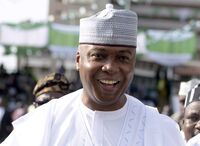South African banks are in talks to start a joint fund that could be used to accelerate the transfer of land to black people as they seek to protect billions of rand in assets tied up in farm loans.
Lenders are wading into the racially charged land-reform debate as the ruling party embraces calls to change the constitution to allow expropriation without compensation. While the African National Congress sees the step as a means to improve equality 24 years after the end of racial segregation, the main opposition party says it is trying to deflect blame from its failure to properly manage earlier land-reform efforts before elections next year.
“We’re absolutely convinced as an industry that for the long-term sustainability of economic and social well-being in this country, we do need
to address the serious problems and inequities we have,” Banking Association of South Africa Managing Director Cas Coovadia said by phone. “There could be various mechanisms through which we do that. A joint fund could be one such mechanism.”
Banks are finding ways of supporting efforts to transfer more land to the black majority in a way that doesn’t undermine property rights and values and risk financial stability. Lenders have 148 billion rand ($10 billion) outstanding in loans for agricultural land, compared with 1.07 trillion rand for residential mortgages, according to the association, which represents 35 local and international lenders.
Skewed Ownership
While the industry supports the ANC’s desire to correct skewed ownership patterns, the constitution already makes provision for expropriation, BASA said in a submission to parliament earlier this year.
White farmers own almost three-quarters of South Africa’s agricultural land, according to an audit by lobby group Agri SA published last year, down from 87 percent during white rule. Laws passed in
1913 allocated only about 7 percent of South Africa’s arable land to black people, leaving more fertile land for whites.
“The narrative at the moment is one of irrational action as far as expropriation is concerned, irrespective of the impact of investment and growth,” Coovadia said. “The narrative that needs to be promoted is one that says land reform and restitution are legitimate issues for this country given our history.”
President Cyril Ramaphosa has repeatedly said that land reform would be done in an orderly fashion, writing in the London-based Financial Times last week that there will be no “land grab.” The planned constitutional amendments will provide greater certainty to both those who want and own land, and promote growth, stability and food production, he has said.
Early Stages
Negotiations on the formation of a fund are still at their early stages and one of many ideas being considered, Coovadia said. No sum for the investment had been discussed yet, he said.
“It need not just be a fund put together by the industry,” Coovadia said. “It could be a fund which other business formations participate in.”
The ANC would support any effort in contributing to the transfer of land to dispossessed South Africans, Enoch Godongwana, a national executive committee member and head of the party’s economic transformation sub-committee, said on Tuesday.
“If the banks are working on such a fund, we welcome that,” he said. “We have been having numerous discussions with the banks.”
Absa Group Ltd., the country’s largest agricultural lender, has proposed two separate funds be managed by professional team -- one to focus on rural land and another on urban projects. It made the proposal in a submission in June to a committee created by South African lawmakers to investigate possible next steps in dealing with land reform.
Technical Assistance
The rural fund will be aimed at creating more black-owned commercial farms by funding the purchase of land, providing technical assistance and facilitating market access for beneficiaries. The urban fund will be targeted at building an affordable housing market and forming more black-owned property developers by providing guarantees against some losses for high-risk residential projects, Absa said.
Through the banking association, Absa and its peers including Standard Bank Group Ltd., Nedbank Group Ltd. and FirstRand Ltd., have also called for a national land audit to identify unproductive land. Absa is also willing to sponsor researchers who can find ways of developing a new land administration system to improve security of tenure, it said.
The lender’s starting point on land reform echoes that of a paper prepared in 2011 for the Department of Rural Development and Land Reform that pointed to a “total system failure” rather than just a single piece of legislation, Absa said. Land reform needs to be done in a way that looks at the entire process “rather than a narrow legal question on expropriation without compensation,” the bank said.













